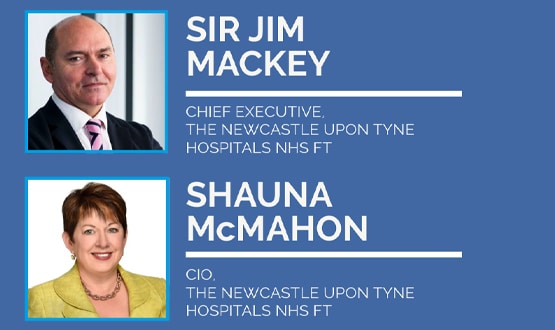Health CIO 2.0
- 24 September 2013

The people who head up IT and information departments may well feel unloved.
Research by Dell – in conjunction with the Harvard Business Review, The Economist and others – found that many chief execs have lost confidence in their chief information officer as a strategic partner.
Almost 50% of those surveyed rated their chief information officers negatively in terms of understanding the business and how to apply IT in new ways. Indeed, many continued to see IT as a commodity, rather than as a differentiator, and the CIO as the person in charge of deploying new kit.
These findings come as no surprise to digital leadership guru, Ade McCormack. “Over the past half century, IT pros have evolved from being individuals in white coats working in discrete lab environments to becoming a central feature in most modern enterprises,” he says.
“From an emotional intelligence perspective, however, their traditional attitude towards users still segregates them fromthe rest of the organisation.
“The result is invariably a breakdown in trust, whereby communication between the IT function and other parts of the organisation is non-aligned, even acrimonious. Poor communication, in turn, is the root cause of many IT failures.”
All of this is likely to sound very, very familiar to CIOs in health or, as they are probably still more likely to be styled, IT directors and IT managers working in the NHS.
McCormack drives home the point. “NHS Connecting for Health was a case in point,” he says. “A set of well-intentioned services was developed without due consultation with its target audience.”
Time for change
McCormack argues that the status of the CIO in general is further weakened by the fact that their rise to seniority is often little more than a long service award, because this makes it even easier for their organisations to see them just as IT managers.
Again, this will chime with many in the NHS. But things need to change. The National Programme for IT may be winding down, but that means trusts will need to make their own IT decisions.
Given the financial and other pressures on the NHS, their IT leaders will need to choose wisely, if they are to help their trusts with such pressing issues as meeting the ‘Nicholson Challenge’ to release £20 billion to bridge the gap between flat funding and rising demand, without destroying access and quality.
In recognition of this, EHI Live 2013 will include a Health CIO conference for the first time, looking at the critical role of the CIO as a leader, and McCormack will be speaking.
“What the NHS doesn’t need is technology for its own sake,” he says. “It needs its output. What’s important is the information required to make better diagnoses, better strategic investments, better supply in line with demand, and so forth.
“The NHS often fails on the most basic of administrative processes because that information is not getting to the right people at the right time.”
Change or die
McCormack goes on to argue, as he often does in his columns for CIO magazine and the FT, that CIOs that fail to grasp what their businesses require of them will not only be failing their organisations, but themselves.
“CIOs who are unable to lead properly because they are too busy fixing the network risk becoming operationally obsolete,” he warns. “They must therefore change from being reactive suppliers to becoming proactive demand creators.
“They need to stimulate users by saying: this is what we can do – would you like some? Yet most CIOs won’t do that because it means doing more work within their existing budget. Many will simply say to users: you’ll get what we want to give you – and when we’re ready to do so.
“The new breed of smart, innovative CIO, on the other hand, recognises that by building trust among users and stimulating them sufficiently, budget will be found. But that requires a very good service ethic which, sadly, many CIOs simply don’t have; which is rather ironic since in healthcare the majority of users themselves have a tremendous service ethic.”
The importance of ‘brand’
As the IT industry becomes increasingly commoditised, McCormack says far less value is being attached to technology per se. “If CIOs care to look around, they’ll notice there’s no chief electricity officer in the boardroom, so it’s very likely that IT will go that way over time.”
With this in mind, he says CIOs should reassess their personal value proposition and reskill accordingly. “A lot of that reskilling won’t be about getting everyone ITIL and Prince 2 accredited,” he says. “It’s more around improving service, enabling innovation, honing commercial skills, and becoming financially savvy.
“What’s more, with some tuning around its interface with users, the IT function could really raise its brand. However, that will require CIOs to have an appreciation of brand management.
“Unfortunately, most do not understand the concept of brand and think that’s only for the marketing guys; whereas smart CIOs recognise that their value is proportional to the brand of their IT function.
“If they don’t actively work on that, then their value perception will remain low. Smart CIOs realise that if they do work on their brand by putting a bit of effort into how they engage and communicate, then they can really change users’ perception of them.”
A tall order
McCormack has no doubt about the importance of the challenge. In future, he argues, the success of a healthcare organisation may hinge on the calibre of its CIO.
“If they understand its business and clinical goals, and have the vision to see beyond the technical horizon, they will be able to help clear hurdles and grab opportunities to create success.
“On the other hand, if they are simply implementers they risk creating a gap in the organisation’s strategic effectiveness.
“Without a tech-savvy strategist on the board, the organisation may miss out on opportunities to use technology to solve problems and create value. Eventually the board may go headhunting a new strategic technology leader to fill that gap.
“CIOs should therefore go out of their way to understand their organisation’s goals and visualise how technology can be used to create what might be; indeed what should be.
“To be true architects of the future, they must immerse themselves in the clinical and business aspects of their organisation, as well as the IT.
“They must know as much about quality measurement as they do about SLAs; they must master consumerism, analytics, chronic disease management and other healthcare issues to understand where future challenges and opportunities lie.
“They must anticipate – not simply react to – the changes ahead and be ready to deal with the human aspects of transformation, as well as the technical.”
It may be a tall order, he says, especially for those who have spent their careers locked in the data centre and hitherto left the business challenges to others.
“But for CIOs who have the vision and the knowledge, it’s a golden opportunity to transform the future for themselves, their organisation and healthcare as a whole. Moreover, those who do rise to the occasion and deliver value in tomorrow’s world will secure themselves a position of leadership in what promise to be exciting times ahead.”
Ade McCormack will address the inaugural Health CIO Annual Conference at EHI Live 2013, which will be chaired by James Thomas, director of ICT at University College London Hospital NHS Foundation Trust, who recently came out top of the CIO 100 organised by CIO Magazine. This year’s conference is free for all visitors to attend.




